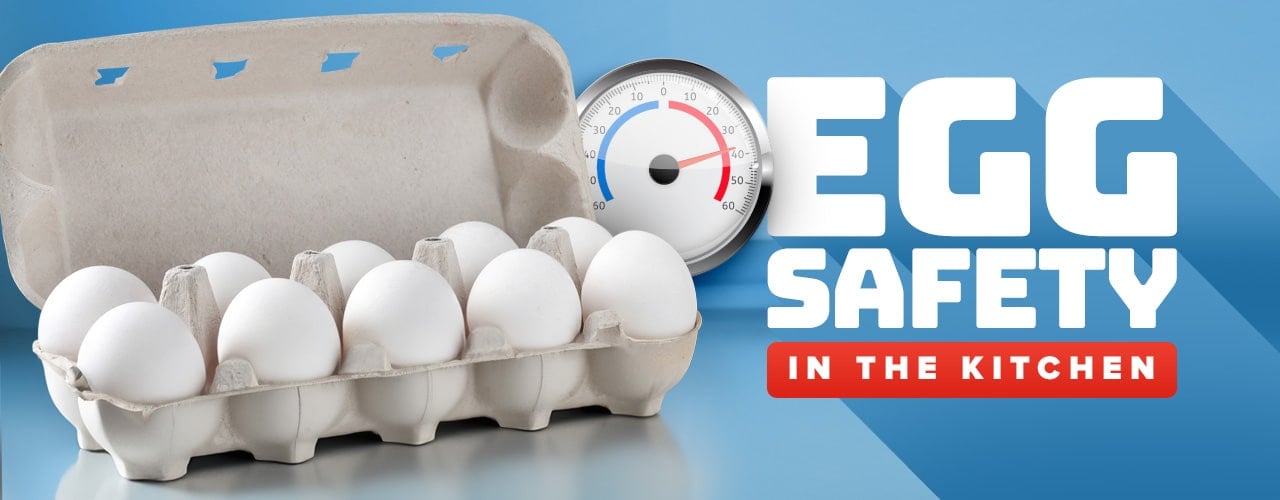
Knowing how to properly handle eggs is vital in both a home and commercial kitchen. Eggs are on the TCS foods list because they are at risk for harboring harmful bacteria, so it’s imperative to practice proper egg food safety. We go over common egg food safety questions below so you can confidently serve eggs on your menu.
How to Tell If Eggs Are Bad

To know if your eggs went bad, fill up a glass cup or bowl with water. Place an egg in the water. If the egg sinks to the bottom and lays flat on its side, the egg is fresh. If the egg sinks but is standing, the egg is edible, just not as fresh as it could be. However, if the egg floats, the egg has gone bad and should not be eaten.
Do Eggs Need to Be Refrigerated?
Eggs need to be refrigerated if they have been washed. Fresh eggs have a natural outer lining on them called a "cuticle" (also known as "cuticula" or "bloom"). This cuticle fills in the egg’s pores to protect the inside of the egg from moisture loss and bacteria. This cuticle allows an egg to sit out at room temperature without spoiling. However, if you’re using store-bought eggs, you will need to refrigerate your eggs as the FDA requires all eggs sold in grocery stores to be washed, which strips the cuticle.
How Long Do Eggs Last?
An egg’s expiration time depends on if the egg has been cooked, cracked open, left in the fridge, or taken out. Discover how long eggs last in each storage application in our video.
Egg Freshness Cheat Sheet
Quickly discover how long eggs will last on your counter or in your fridge.
- How Long Do Eggs Last in the Fridge? According to the USDA, eggs can last in the fridge for three to five weeks. However, double-check the “sell by” or expiration date to better understand the exact date for your eggs.
- How Long Do Eggs Last on the Counter? If the eggs you are using are store-bought and have their cuticle stripped, they can last on the counter for a maximum of two hours.
- How Long Do Fresh Eggs Last? If the eggs are farm-fresh and do not have their cuticle stripped, they can sit on the counter for about two weeks.
- How Long Are Cooked Eggs Good For? Hard-cooked eggs can last in the fridge for up to a week. Cooked eggs can sit out for a maximum of two hours.
- How Long Do Pooled Eggs Last? If you made pooled eggs to help speed up brunch service, do not leave them on the counter. Store them in the refrigerator between uses so they do not go into the temperature danger zone.
Can You Eat Raw Eggs?

You can eat raw egg products as long as they are pasteurized, but you may still risk coming into contact with the foodborne illness Salmonella. If an egg product is pasteurized, that means it has been heat-treated to destroy bacteria, but an egg product can still have Salmonella present due to insufficient pasteurization or contamination after the treatment. If the egg products have not been pasteurized, you should not eat them raw or undercooked, as you are far more likely to come into contact with Salmonella.
What Temperature Should Eggs Be Cooked To?
The temperature your eggs must be cooked to depends on your service style and who you are feeding. Follow our outline below on egg cooking temperatures.
- Eggs that are served immediately should be cooked to 145 degrees Fahrenheit.
- Eggs held for service should be cooked to 155 degrees Fahrenheit.
- Eggs prepared in the microwave or present in another dish should be cooked to 165 degrees Fahrenheit.
- If you're serving vulnerable populations such as the elderly, children, pregnant women, or people with weakened immune systems, eggs should be cooked to at least 160 degrees Fahrenheit.
Is Salmonella on the Egg Shell or Inside?
Salmonella can be present on both the eggshell and inside of the egg. Therefore, you must ensure you’re following proper time and temperature rules for storing, handling, and cooking eggs so they are safe to consume.
Are Eggs Pasteurized?
In the United States, all egg products (egg contents that have been removed from their shell) are required by law to be pasteurized. Pasteurization is a process of partial sterilization through heat treatment for safe consumption, affecting foods such as eggs, milk, and wine. The Egg Products Inspection Act (EPIA) was implemented in 1970 to reduce the risk of foodborne illness across the nation, especially for vulnerable populations such as children, pregnant women, and the elderly.
How to Get Eggs to Room Temperature
Sometimes baking recipes will specifically call for room-temperature eggs. Room-temperature eggs mix in with a batter more easily and provide a more stable rise. Here’s how to safely bring eggs to room temperature for your baking recipes:
- Place eggs that are still in their shells in a heatproof bowl.
- Cover with warm water. The temperature should be similar to a bath: not scalding, but not lukewarm.
- Let eggs sit for 10-15 minutes.
- Dry the eggs and use as needed.
Egg Storage Temperature
Eggs should be stored at 40 degrees Fahrenheit. Position them in the coldest part of the refrigerator, and never put them in the door of the refrigerator where the temperature fluctuates the most.
Tips for Handling Eggs

Here are a few more tips for proper egg food safety to follow in your kitchen.
- When receiving eggs at your restaurant, they should be at an air temperature of 45 degrees Fahrenheit or lower.
- Inspect the eggs carefully upon receiving and do not accept any cracked or dirty eggs.
- After handling raw eggs or shelled eggs, thoroughly and properly wash your hands to avoid cross-contamination.
- Avoid cross-contamination by washing and sanitizing utensils and cooking equipment that came into contact with raw eggs.
There are many food safety guidelines to follow when preparing food, and eggs are one of the trickiest. Keep in mind these egg food safety tips to keep your guests safe and regularly coming back for brunch service.





